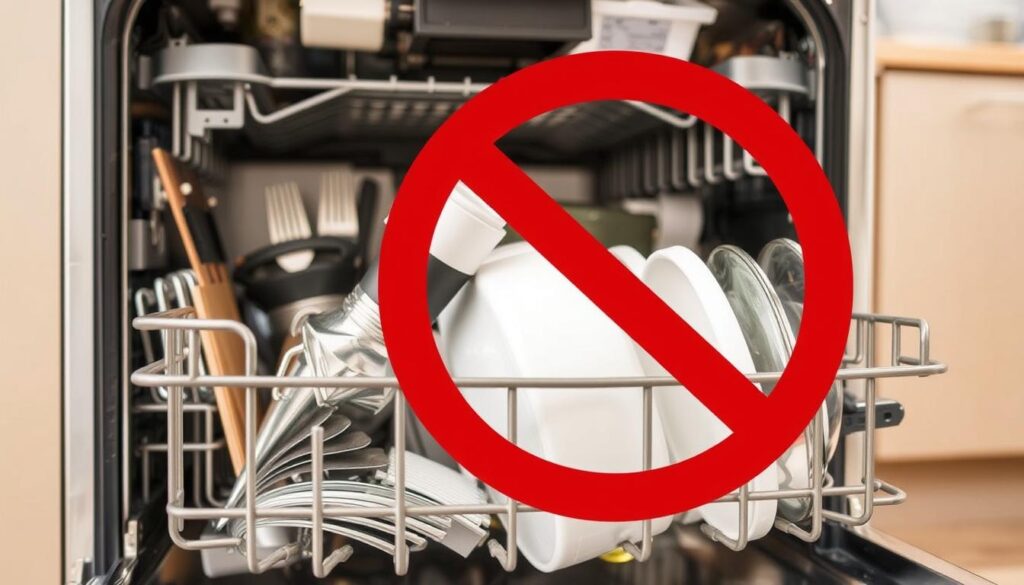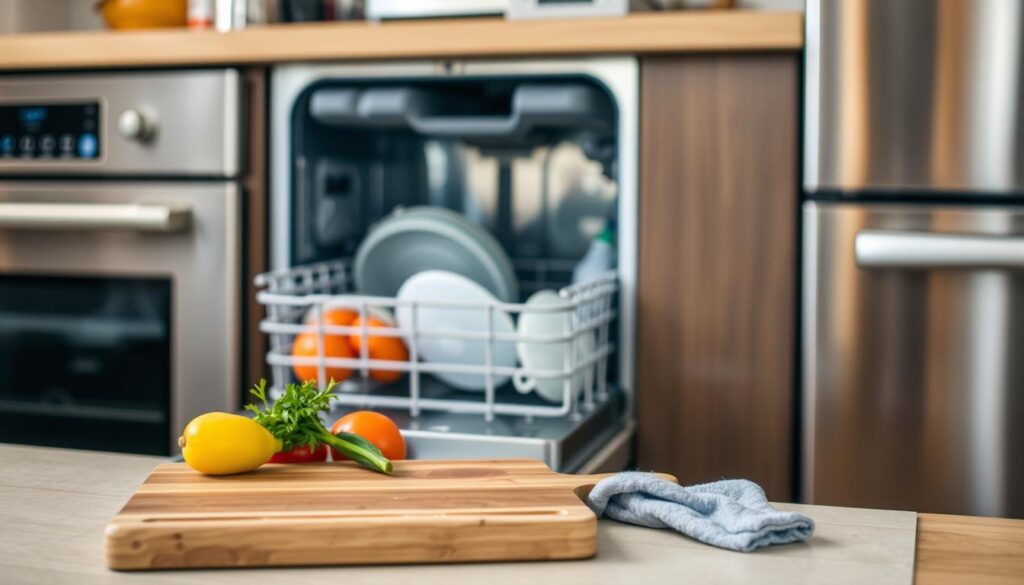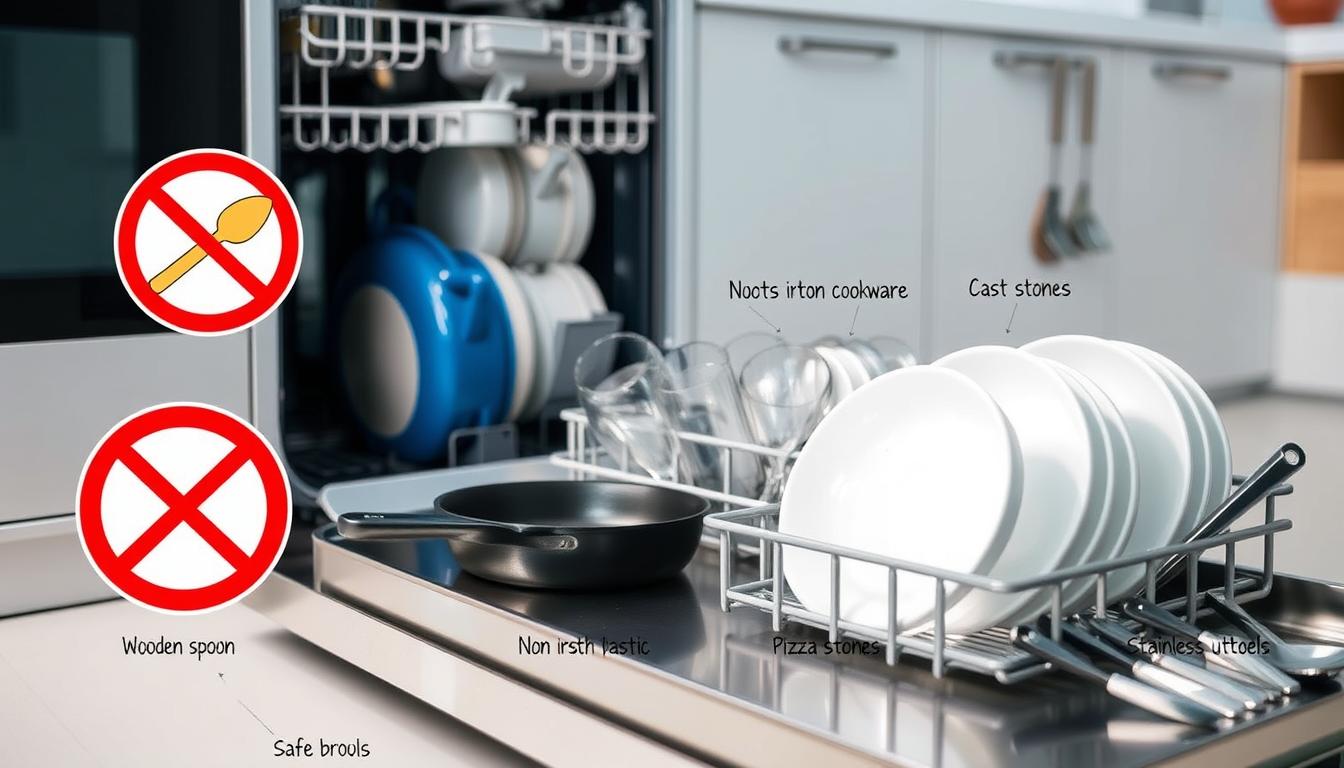When you load your dishwasher, you might wonder what’s okay to put inside. Knowing what not to put in your dishwasher is key to keeping it working well. By following some simple tips, you can avoid damage and save money on repairs.
Properly loading your dishwasher and being careful about what you put inside matters a lot. Learning about dishwasher safety and maintenance helps your appliance last longer. This way, you can avoid the 11 things you should never put in your dishwasher and enjoy a hassle-free experience.
Table of Contents
Understanding Your Dishwasher’s Limitations
Using your dishwasher right is key to keeping it in good shape. Knowing the dishwasher guidelines helps you avoid mistakes that can harm it. This knowledge helps your dishwasher work its best.
Proper loading is a big part of dishwasher care. Too many dishes or the wrong way can mess up cleaning, damage dishes, and harm the dishwasher. Always follow the maker’s loading tips and make sure dishes have room for water to move.
How Dishwashers Actually Clean
Dishwashers clean with hot water, detergent, and spray arms. Dishwasher maintenance advice often includes checking and replacing parts like spray arms and seals. This keeps your dishwasher running smoothly.
Common Causes of Dishwasher Damage
Damage often comes from overloading, wrong detergent, and not cleaning the filter. By following dishwasher guidelines and avoiding these issues, you can make your dishwasher last longer.

Why Proper Loading Matters
Proper loading is vital for your dishwasher’s best performance. Here are some tips:
- Leave enough space between dishes for water to flow freely
- Avoid overloading the dishwasher
- Use the correct cycle for the type of dishes being washed
By following these tips and knowing your dishwasher’s limits, you can avoid damage. Always stick to dishwasher guidelines and avoid common dishwashing mistakes to avoid for the best results.
Wooden Items and Cutting Boards
Proper dishwasher use is key to keeping your kitchen items in good shape. Some items can get damaged by the dishwasher’s high heat and strong detergents. Wooden items and cutting boards are examples of things that shouldn’t go in the dishwasher.
These items can crack, warp, or change color from the dishwasher’s heat and moisture. Hand washing is the safest way to clean them. It lets you control the temperature and the cleaning products used. This way, your wooden items and cutting boards will stay in better condition and last longer.
Here are some tips for caring for your wooden items and cutting boards:
- Wash them by hand with mild soap and warm water
- Dry them thoroughly after washing to prevent moisture buildup
- Apply a food-safe oil to the wood to keep it moisturized and protected

By following these tips and avoiding the dishwasher for your wooden items and cutting boards, you can help maintain their quality and extend their lifespan. Remember, proper dishwasher use and kitchen appliance care are essential for keeping your kitchen running smoothly and efficiently.
| Item | Dishwasher Safe | Hand Wash |
|---|---|---|
| Wooden cutting boards | No | Yes |
| Plastic cutting boards | Yes | No |
| Wooden utensils | No | Yes |
Delicate Glassware and Crystal
Cleaning delicate glassware and crystal in the dishwasher needs careful steps to avoid damage. Knowing what to do and what not to do is key. This way, your valuable items stay safe and sound.
Temperature changes can be a big problem for these items. Sudden temperature shifts can cause them to break. Always check the manufacturer’s guidelines for the right temperature. Handling fine stemware with care and avoiding extreme temperatures is also important.
Temperature Sensitivity Issues
Hand washing might be a better choice for delicate items. This way, you can control the water temperature and use gentle cleaners. Following these tips helps keep your glassware and crystal safe for many years.
Proper Care for Fine Stemware
Here are some important tips to remember:
- Avoid using abrasive cleaners or scrubbers
- Don’t overload the dishwasher, as this can cause items to break or become chipped
- Use a gentle cycle with a low temperature setting
Alternative Cleaning Methods
By following these simple tips, your delicate glassware and crystal will stay in great shape. You can enjoy them for years, all while keeping them safe from dishwasher damage.
11 Things You Should Never Put in Your Dishwasher
To keep your dishwasher working well, it’s key to know what not to put in it. Knowing what to avoid helps protect your kitchen items. This way, you take good care of your kitchen appliances and utensils.
Some things you should never put in the dishwasher include:
- Cast iron cookware, which can rust or lose its seasoning
- Non-stick pans, which can be damaged by high heat and harsh detergents
- Disposable plastics, which can melt or warp
- Sharp knives, which can become dull or damaged
- Gold-trimmed dishes, which can be damaged by the high heat and harsh chemicals
By avoiding these items, you help your kitchen utensils and appliances last longer. They will keep working well and efficiently.
Remember, taking care of your kitchen appliances is important. It helps avoid mistakes and keeps your kitchen running smoothly.
Heat-Sensitive Materials and Items
When using the dishwasher, it’s key to know what materials can be washed safely. Items like plastic utensils and some glassware can get damaged by high heat. It’s important to follow the right guidelines to avoid damage.
Some items you should not put in the dishwasher include:
- Plastic utensils and containers
- Certain types of glassware, such as fine crystal or delicate wine glasses
- Wooden items, like cutting boards or spoons
Washing these items by hand is safer. Use mild soap and warm water. This way, they stay in good shape. Following these tips helps your kitchen items last longer.
Some materials need special care. For example, some glassware is okay in the dishwasher but only on a gentle cycle. Always check the manufacturer’s instructions. This ensures your items are washed safely and effectively.
Being careful about what you wash in the dishwasher is crucial. It helps prevent damage and keeps your kitchen items in top condition. Always refer to the manufacturer’s guidelines for washing different materials.
| Material | Dishwasher Safe | Hand Wash |
|---|---|---|
| Plastic utensils | No | Yes |
| Glassware | Some types | Yes |
| Wooden items | No | Yes |
Dishwasher-Safe vs. Hand-Wash Only: Understanding Labels
Understanding labels on your dishes and utensils is key to kitchen appliance care. You want to avoid dishwashing mistakes that can harm your items or your dishwasher. Following the right dishwasher maintenance advice is important.
To care for your kitchen items, knowing what labels mean is crucial. Symbols like dishwasher safety, microwave safety, and hand-wash only are common. Recognizing these symbols helps avoid mistakes that can damage items or reduce performance.
Common Labeling Symbols
- Dishwasher safe symbol: a picture of a dishwasher
- Hand-wash only symbol: a picture of a hand under a faucet
- Microwave safe symbol: a picture of a microwave
When to Doubt “Dishwasher Safe” Claims
Even if an item is labeled “dishwasher safe,” caution is still needed. If unsure, it’s best to wash it by hand. This is true for delicate or antique items that need special care.
By following these guidelines and understanding labels, your kitchen items will last longer and work better. Always check labels and follow care instructions to avoid mistakes and keep your kitchen appliances in good shape.
| Label Symbol | Meaning |
|---|---|
| Dishwasher safe symbol | Item can be washed in a dishwasher |
| Hand-wash only symbol | Item should only be washed by hand |
| Microwave safe symbol | Item can be heated in a microwave |
Best Practices for Dishwasher Loading
To keep your dishwasher running well, follow the right loading tips. This helps avoid damage and keeps it working great for longer. Learning how to load your dishwasher is key dishwasher maintenance advice.
Proper loading is vital for your dishwasher’s best performance. Start by sorting items on the upper and lower racks by size and type. Put big, heavy items like plates and bowls on the bottom rack. Save the top rack for smaller, delicate items like glasses and cups. This way, everything gets cleaned well and nothing breaks.
Upper Rack Guidelines
For the top rack, face cups and glasses towards the dishwasher’s center. This stops water from getting trapped inside. Also, put utensils in their basket to avoid damage from other items.
Lower Rack Organization
On the bottom rack, arrange plates and bowls so water can flow between them. This stops food from building up and makes sure everything gets clean. By following these proper dishwasher use tips, you’ll keep your dishwasher running smoothly and last longer.
Utensil Basket Do’s and Don’ts
When using the utensil basket, keep sharp items like knives and forks separate. This prevents damage. By following these simple dishwasher guidelines and dishwasher maintenance advice, your dishwasher will stay in top shape and work well for years.
Conclusion: Protecting Your Dishwasher Investment
Protecting your dishwasher is key for its best performance and long life. Knowing its limits and following good practices helps a lot. Avoid putting wooden items, delicate glassware, and heat-sensitive materials in it to prevent damage.
Also, don’t put cast iron cookware, non-stick pans, and sharp knives in the dishwasher. This keeps your dishes and the dishwasher safe.
Always check the labels on your dishes and utensils to see if they’re “dishwasher safe.” Following these safety tips and practices keeps your dishwasher working well for a long time.
FAQ
What are some common mistakes people make when using their dishwasher?
Some common mistakes include putting the wrong items in the dishwasher. Overloading the racks and not pre-rinsing dishes are also errors. These mistakes can damage the dishwasher and dishes, and lead to poor cleaning.
What are some items that should never go in the dishwasher?
Items like cast iron cookware, non-stick pans, and sharp knives should not go in the dishwasher. Also, avoid disposable plastics and items with gold or silver trim. These can get damaged or discolored in the dishwasher’s heat and detergents.
How can I properly load my dishwasher to ensure the best cleaning results?
To load your dishwasher right, put big items on the bottom rack and small ones on top. Don’t overcrowd the racks. Make sure items are placed so they don’t block the spray arms. Also, put utensils in the basket with handles down.
What are some signs that my dishwasher needs maintenance or repair?
Signs your dishwasher needs help include poor cleaning, strange noises, leaks, and longer cycles. If you see these, check the manual or call a repair expert.
How can I tell if an item is safe to put in the dishwasher?
Check for “dishwasher safe” labels on items. Avoid putting wood, crystal, or delicate materials in the dishwasher. They can get damaged by the heat and detergents.
How can I maintain my dishwasher to keep it running efficiently?
To keep your dishwasher in good shape, clean the filters often. Run a cleaning cycle with dishwasher cleaner or vinegar every few months. Don’t overload the racks. Follow the manufacturer’s maintenance tips.

